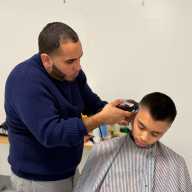Read Related Article #2: Culture
Read Related Article #3: Survivor Profile: Inge Auerbacher
Read Related Article #4: 60 years later
Read Related Article #5: Survivor Profile: Hannah Deutch
Read Related Article #6: Second generation survivors react
Read Related Article #7: Survivor Profile: Jane Keibel
Read Related Article #8: Survivor Profile: Ann Klamka
Read Related Article #9: Survivor Profile: Lena Goren
As many survivors eventually made their way to the United States to start over, they were faced with many challenges as they adjusted to a new life.
Following the war, Eddie Weinstein was in a German displaced persons camp. He said that in Poland there were still pogroms taking place against the Jews and that they were being killed.
“I wanted to get out of Europe,” Weinstein said. “It was enough. We went through enough.”
Weinstein had an uncle living in the Bronx who was able to send papers for Weinstein, his wife, father, and his father’s new wife to come to the United States. He initially lived in the Bronx and eventually began working in a raincoat shop in the garment district.
Language proved to be a significant barrier, with many survivors not knowing English when they arrived. When Larry Wenig came to the United States and began living with relatives, he was determined to go to school, although he was a 22-year-old who had not yet finished high school and did not speak English. He worked during the day and attended classes at night with the help of a Polish-English dictionary. He reached his dream of becoming a lawyer and had a successful private practice.
Many survivors said that they did not let language barriers get in the way and were able to pick up English rather quickly through various means.
Upon arrival, there was also the matter of finding housing and employment. Some survivors either stayed with relatives or were able to find their own housing with their relatives’ assistance.
Ellen Alexander came to the United States from England with her mother and sister in November of 1947. Within three days, she had found work. She worked as a secretary and later attended Queens College and became a New York City school teacher.
Of course, the survivors were also dealing with residual emotions from what they had endured during the Holocaust. Esther Katz and her mother came to the United States during the war to join her father. She said that her mother told her she thought about it every day of her life, particularly because of having left her grandparents behind. Katz said that, for her, the most important thing is to keep the memory of her grandparents, Karolina and Louis Goldmeier, alive.
“All of my friends had more or less the same background so we all knew that at times our parents were very sad,” Katz said. “When we lit candles on Friday night my mother would almost always cry because she just thought of her parents. It never really went away.”
When Lena Goren moved to the United States with her family in 1948, she also did not speak English, although she learned the language by listening to the radio and reading magazines. She also found it difficult to be in a country where she did not know anyone else and said she was very unhappy at first. It took her about a year to adjust.
“It was the worst experience that anybody can have,” Goren said of the transition.
Floral Park resident Eva Kessner came to the United States with her family when she was about seven years old. Her parents came with only $200 and, although both had Ph.D.s, they did not speak the language. A housing shortage in New York proved to be a problem.
When they did find an apartment, Kessner said it was in an area that forced her to go to a tough school. She only could speak French and German at the time, although she learned English quickly.
“In those days, they weren’t too helpful about getting you to adjust,” Kessner said. “I just had to sink or swim. I managed but it was very difficult for me.”
Jane Keibel came to the United States on January 6, 1940. Her father’s two brothers, who lived in Kew Gardens, met the family at the ship. They got on the subway to head to Kew Gardens, where Keibel still lives today. She remembers walking through a park and a few feet of snow, although they did not have much in the way of winter clothing.
Keibel began attending Richmond Hill High School, and said that she found the new language and culture to be somewhat frightening. Although her cousins had told her what to expect at school, she was still not fully prepared.
“But going to school without knowing the language - you go from class to class and they talk and you don’t understand a word they’re saying,” Keibel said. “It was tough; it was very, very tough.”





























